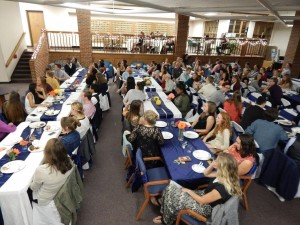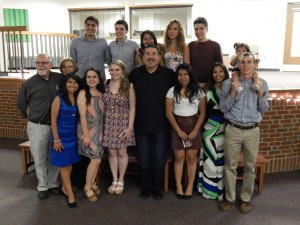This month saw a symbolic “passing of the torch” in the Latino Student Alliance at Eastern Mennonite University, as four comadres, their friendship forged by a common love of heritage and culture, moved out of leadership positions they have held for the past three years. The women, all seniors, are largely responsible for the visibility and resurgence of the club, known as LSA, over the past four years. [See slide show below.]
Their friendship actually began with LSA, which makes for four long years of learning and growing together, most commonly communicating “in Spanglish,” they say. Though each has held formal leadership positions in the club, in reality “there is no hierarchy,” says one.
- Meet Ana Cruz, of New Market, Virginia, who plans a career in elementary school special education. She’s calm and cool under pressure, and always willing to represent the group at meetings. When tensions rise, she is always the one to break the ice.
- Fernanda “Fer” Hernandez, a senior business administration major, is from Honduras. “Fer is the most organized and detail-oriented of us all,” says one of her friends. “We would throw ideas out and the next meeting she’d have a plan.”
- Paola Diaz, from McGaheysville, Virginia, is a kinesiology major, double minoring in psychology and coaching. A consummate networker who is well-known in the local community, she’s “all about the connections.”
- And there’s Rebecca Cardwell, from Maryland, who is a Spanish education and TESOL major, who has been “welcomed with open arms” into the Latino community, she says. Her strength is a contagious enthusiasm that provides momentum. “We always say that her heart is definitely Hispanic,” says club advisor Maria Esther Showalter, a native of Bolivia.
The four friends have been “fabulous leaders,” says Susannah Lepley, director of Multicultural Services. “They have grown in confidence, learned to stand up when the situation warrants, to manage conflict effectively and persevered when things did not work out … they show this leadership not just on campus, but in their churches and communities, too.”
Latinos ‘more than just immigrants’
When the foursome joined LSA, the club had only a few members and was coming off a stretch in which activities of the club revolved around political activism in favor of immigration reform. With the support and encouragement of Susannah Lepley, the four women decided to emphasize Latino culture in all its breadth and diversity. Since 2014, Maria Esther Showalter, who teaches in the Intensive English Program, has continued to support and “empower us as student-leaders to make choices,” said Rebecca.
Latino culture, they decided, would be a meeting point for EMU’s Latino students, most of whom were local commuters, and the broader EMU community.
“While the DREAM Act and immigration reform are important, we didn’t want to be defined by that. We are more than just immigrants,” says Fernanda. “We wanted to show what our culture is like … food and culture and bright colors … We really wanted to change the focus.”
Banquet grows annually
Latino Heritage Month, which falls in September, provided a natural focus for the club’s events, which includes a chapel service, always followed by café con pan dulce (coffee with sweet bread); a welcome luncheon; movie screenings; and other activities, the most successful of which has been an annual banquet.

Staging the banquet was the first major event for the then-sophomore leaders, who underestimated the crowd and the amount of work involved. Fernanda says the four chefs “did all the cooking for 100 people at my house.” Then they rushed it all to EMU, arriving with the smells of plantains and chicken clinging to their clothes.
“In the recent years we have catered the Pollo a la Braza, plátanos fritos, pupusas, flan, tres leches, and other side dishes from local Hispanic restaurants,” says Maria Esther Showalter, “but many students also volunteer to cook. We always think we will have enough food but we always have more students than we expect.”
With music, storytelling and post-dinner salsa dancing, the event has grown every year, with a crowd of about 180 attending the 2015 event.
This year, LSA partnered with two departments to host Chilean-American writer Marjorie Agosin. They also helped during the Noche Bohemia, which showcases the creativity and language skills of Spanish language learners in a fun, supportive environment.
Volunteering has also been a part of the club’s efforts: they’ve set up a Christmas program with Skyline Literacy and worked with a multicultural family literacy program in Washington D.C.
Club now more present to first-years, Latino community

One result of the club’s successful banquet was an invitation from Campus Activities Council to take over the mixer for first-years on the final night of orientation. Instead of square dancing, LSA teaches salsa dancing. Rebecca says one student who saw her on campus recognized her and said he met all his friends that night.
“LSA is part of what first-year students see and participate in when they arrive on campus that first week,” Rebecca said. “First-years see a diverse community here. Then we carry that awareness through into Latino Heritage Month. It’s been really important and helpful to have that presence from the start of the school year.”
“We’ve come a long way from when we started, when the Latino community really wasn’t represented on our campus in a strong, visible way,” says Fernanda. “Connecting with our Latino students, who are often commuters who are working and many are first-generation college students, has also been very meaningful to us. We want to nurture Latinos coming here, because even if you grow up in the States, you might not feel comfortable here on campus.”
Paola says by being present and sharing their stories, some of which involve overcoming prejudice, there is growing potential for LSA members to nurture and support first-generation college students.
Among a host of other possible activities to get involved with, LSA has been their main interest over the years, the women say, because they have made an important difference in the campus community.
“We have chosen to invest time in LSA because we want to grow together, and we want to share our love for our culture and build cultural competency on the campus,” Ana says. “We’ve been able to do that, but also support our other groups, like International Student Organization and Black Student Union, so that we all have representation.”
They’re leaving EMU with many accomplishments to celebrate besides the foundation they’ve laid for LSA. Two of the four seniors have one more semester on campus, which means they will all be present for the celebrations, as damas de honor, at Paola’s fall 2016 wedding.
LSA meets Tuesdays at noon for informal conversation in the dining hall, and also from 3:30-4:30 p.m. on Fridays in the Multicultural Student Services office.
